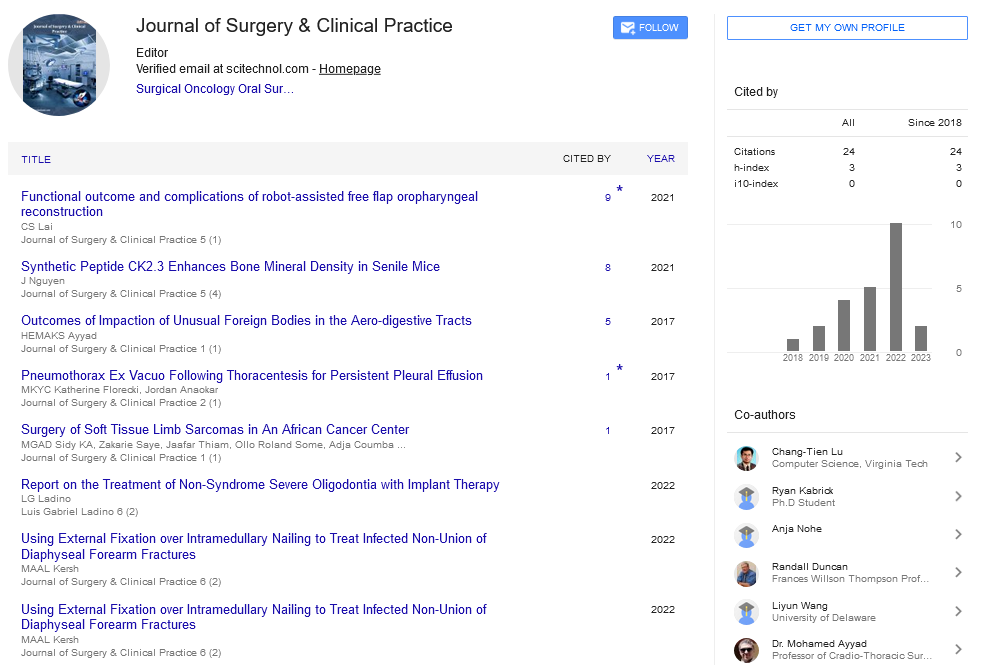Perspective, J Surg Clin Prac Vol: 7 Issue: 1
Advancements and Challenges in Surgical Management of Pediatric Tumors
Ross Bremner*
Department of Surgery, University of British Columbia, Vancouver, Canada
*Corresponding Author: Ross Bremner
Department of Surgery, University of
British Columbia, Vancouver, Canada
E-mail: bremer@ross.ca
Received date: 22 February, 2023, Manuscript No. JSCP-23-95364;
Editor assigned date: 27 February, 2023, Pre QC No. JSCP-23-95364(PQ);
Reviewed date: 15 March, 2023, QC No. JSCP-23-95364;
Revised date: 22 March, 2023, Manuscript No: JSCP-23-95364(R);
Published date: 30 March, 2023, DOI: 10.35248/JSCP.23.7.100375.
Citation: Bremner R (2023) Advances and Challenges in Surgical Management of Pediatric Tumors y. J Surg Clin Prac 7:1.
Keywords: Surgical Management
Description
Surgical management of pediatric tumors has significantly improved over the years. The use of minimally invasive techniques, such as laparoscopy has reduced the size of incisions, minimizing pain and scarring, and reducing hospitalization time. Additionally, advances in surgical planning using imaging modalities such as MRI (Magnetic Resonance Imaging) and CT (Computed Tomography) have allowed for more precise surgical planning and reduced the risk of damage to surrounding structures. The management of pediatric tumors has come a long way over the years, with significant advances in surgical techniques, imaging modalities, and medical therapies. However, pediatric tumors present unique challenges, and their management requires a multidisciplinary approach.
One of the most significant advances is the development of intraoperative imaging technology, such as intraoperative MRI and ultrasound. These techniques enable the surgeon to visualize the tumor in real-time, allowing for more precise resection, and reducing the likelihood of leaving behind residual tumor cells. This technology has been particularly useful in the surgical management of brain tumors, where it is often difficult to distinguish between healthy brain tissue and the tumor. The use of computer-assisted surgery, which involves using preoperative imaging to create a 3D model of the tumor and surrounding structures, is advancement. This model can then be used to plan the surgery, allowing for more precise resection and reducing the risk of complications. Computer-assisted surgery has been particularly useful in the surgical management of complex tumors, such as those involving the spine or skull base. Despite these advances, surgical management of pediatric tumors still presents significant challenges. One of the biggest challenges is the location of the tumor. Many pediatric tumors are located in areas that are difficult to access, such as the brainstem, spinal cord, or deep within the abdomen or chest. Surgery in these areas requires a high level of expertise and may be associated with significant risks, such as nerve damage or bleeding.
The risk of complications associated with surgery is infection or bleeding. While advances have reduced the complications but still they occur. The use of antibiotics and other preventive measures such as the use of anticoagulants may be necessary to reduce complications. The impact of surgery on the developing brain is also a significant concern. Surgery in the brain can disrupt normal brain development and lead to long-term cognitive deficits. This risk is particularly high in young children, whose brains are still developing. The use of intraoperative imaging and other surgical techniques may help reduce this risk, but it remains a significant concern. Finally, the psychological impact of surgery on children and their families cannot be overlooked. Surgery is often a traumatic experience for children and their families, and the recovery process can be challenging. Children may require significant support and counseling to help them cope with the emotional and psychological aspects of surgery.
Managing these challenges requires a multidisciplinary approach, involving the collaboration of surgeons, oncologists, radiologists, and other healthcare professionals. With ongoing research and development, we can expect further advances in the surgical management of pediatric tumors, ultimately improving outcomes for children with cancer.
 Spanish
Spanish  Chinese
Chinese  Russian
Russian  German
German  French
French  Japanese
Japanese  Portuguese
Portuguese  Hindi
Hindi 
